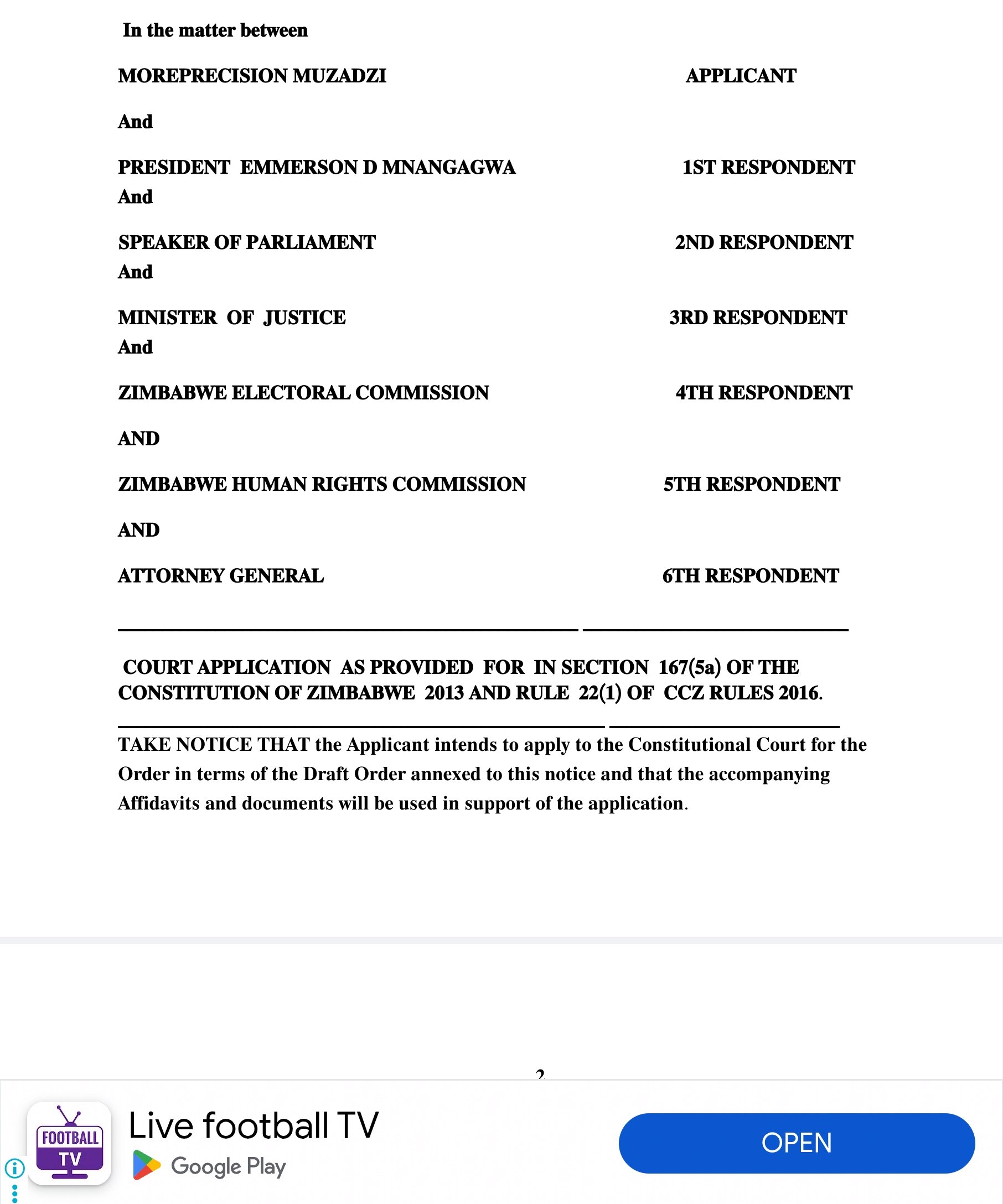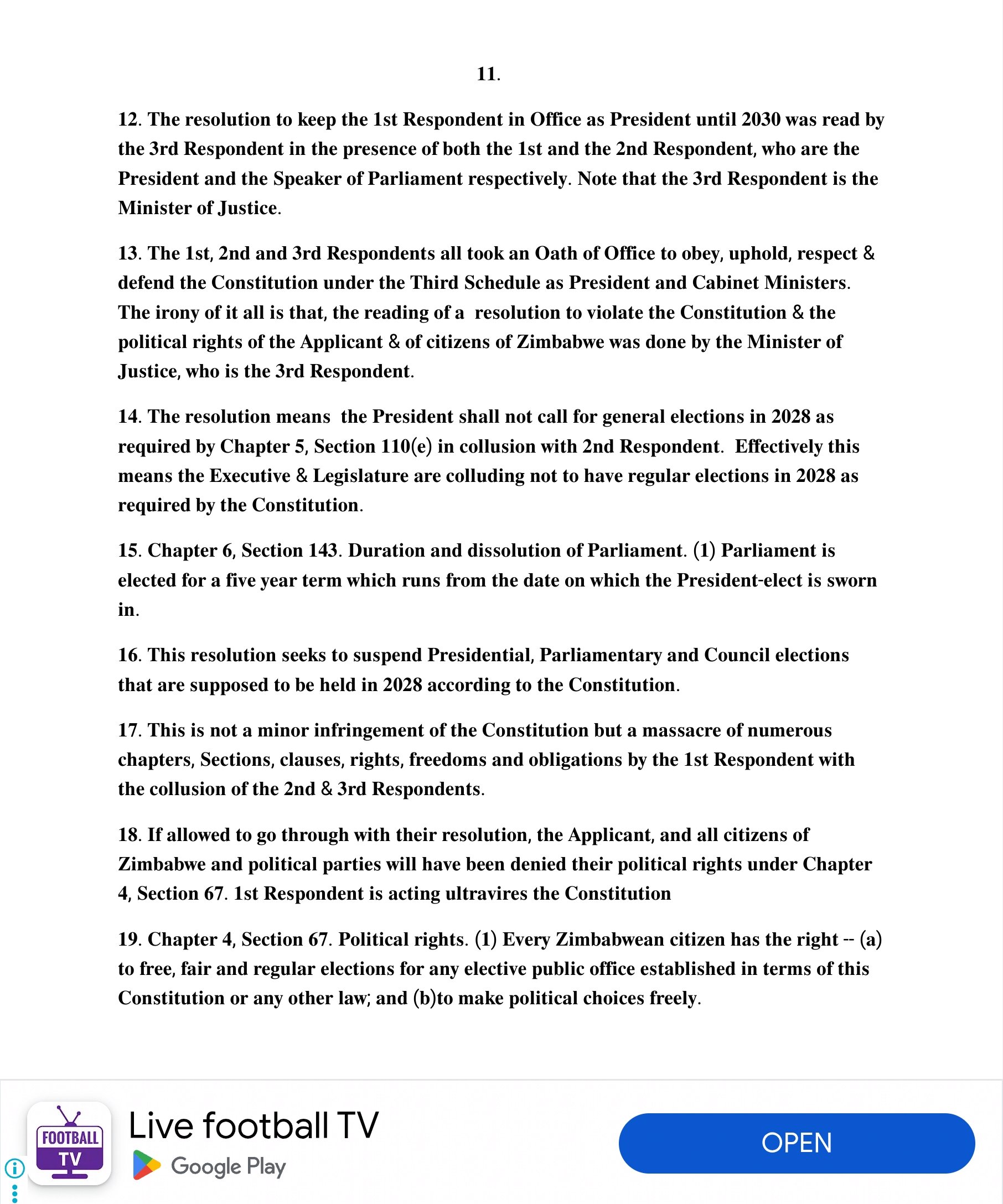HARARE – A fresh constitutional storm is brewing after a previously unknown person named Moreprecision Muzadzi filed an urgent application at the Constitutional Court seeking to challenge the controversial resolution aimed at extending President Emmerson Mnangagwa’s term in office until 2030.
According to court documents seen by this publication, Muzadzi is challenging what he calls an unconstitutional move to suspend Presidential, Parliamentary, and Council elections that are due in 2028, arguing that a resolution was read by the Minister of Justice, in the presence of the President and the Speaker of Parliament, to keep Mnangagwa in power beyond his current constitutional term.
The court papers accuse top state officials — including the President (1st Respondent), the Speaker of Parliament (2nd Respondent), and the Minister of Justice (3rd Respondent) — of “colluding to violate” the Constitution and deny citizens their political rights guaranteed under Chapter 4, Section 67 of the Constitution of Zimbabwe (2013), which provides for free, fair, and regular elections.
“The irony is that a resolution to violate the Constitution was read by the Minister of Justice himself,” the application says.
Muzadzi argues that the resolution effectively suspends elections scheduled for 2028, in violation of Chapter 5, Section 110(e) and Chapter 6, Section 143, which stipulate that Parliament and the Presidency each serve a five-year term.
The court papers describe the resolution as “a massacre of numerous constitutional clauses, rights, freedoms, and obligations,” claiming that the move seeks to consolidate power within the Executive and Legislature by colluding to postpone elections.
However, the application has triggered deep suspicion from opposition figures and political commentators, who suspect it is part of a broader political scheme to sanitise the 2030 agenda through the judiciary.
Political activist Jealous Mawarire, a long-time critic of Mnangagwa’s alleged bid to extend his stay in power, dismissed the court application as a cover-up operation orchestrated to give legitimacy to the President’s controversial ambitions.
“The guy making this application, Moreprecision Muzadzi, has been seeking funding from NGOs as a front for Professor Jonathan Moyo’s mischievous Constitutional Court agenda against the so-called 2030 plan,” Mawarire said. “It’s a desperate attempt to make it look like this case is backed by civil society and the general public — when in fact, it’s political theatre designed to justify Mnangagwa’s continued stay in power.”
Mawarire added that the manoeuvre reflects a calculated strategy to “use the courts as a political bypass” to avoid a national referendum, which would be required to lawfully amend the presidential term limit under the Constitution.
“These guys are desperate to keep President Mnangagwa in power until 2030,” Mawarire added. “It’s a dangerous path toward turning Zimbabwe into a monarchy, with the judiciary being used to rubber-stamp political ambitions.”
The case underscores intensifying political tension around succession and constitutional governance within ZANU PF. Critics warn that any attempt to extend Mnangagwa’s term without a referendum would erode constitutionalism, deepen public mistrust in state institutions, and potentially trigger a political crisis reminiscent of Zimbabwe’s turbulent post-2017 transition.
As the Constitutional Court prepares to hear the matter, questions loom over whether the judiciary will uphold the spirit of constitutional democracy or be drawn into what analysts describe as “a sophisticated legal choreography” aimed at entrenching Mnangagwa’s rule beyond 2028.

